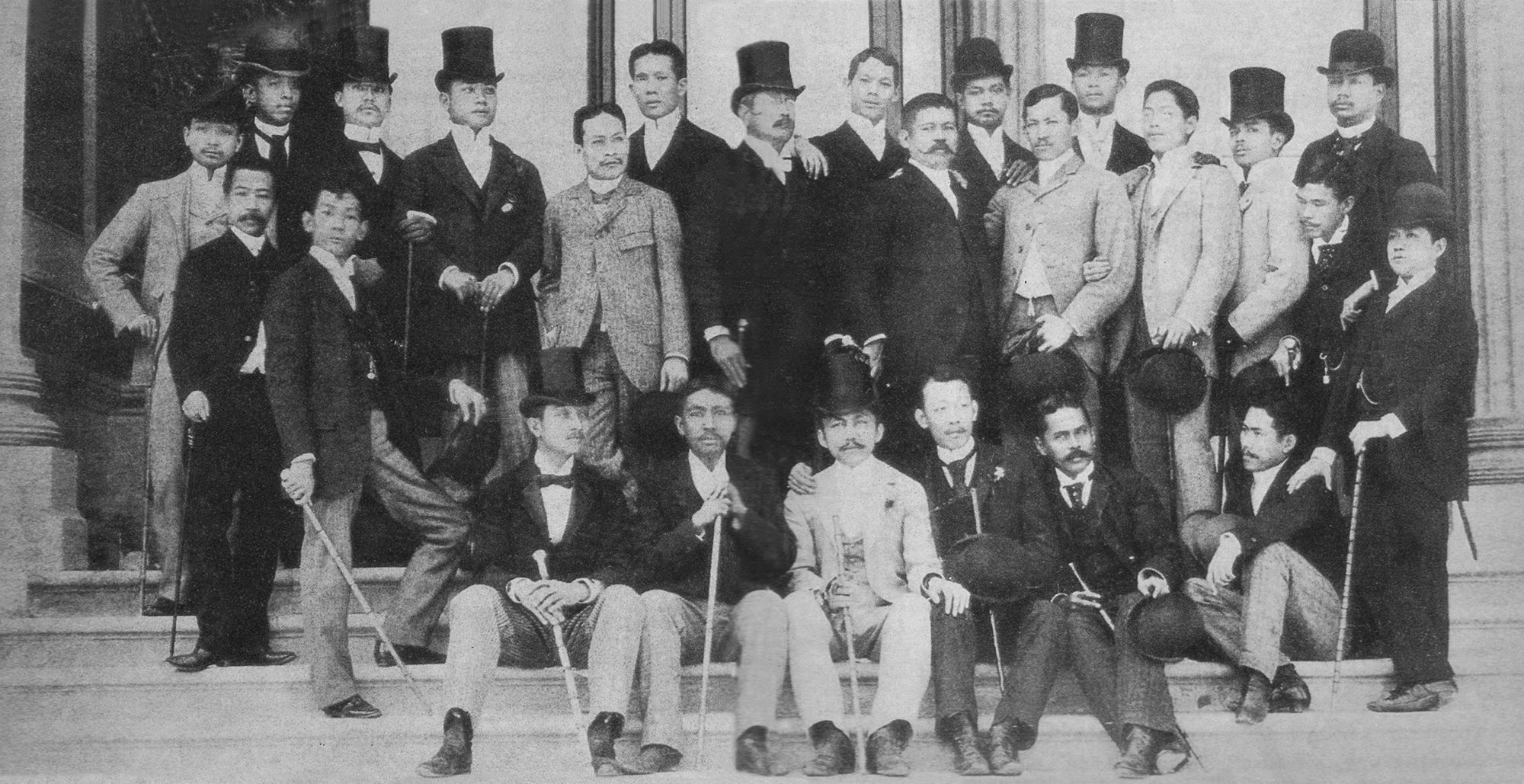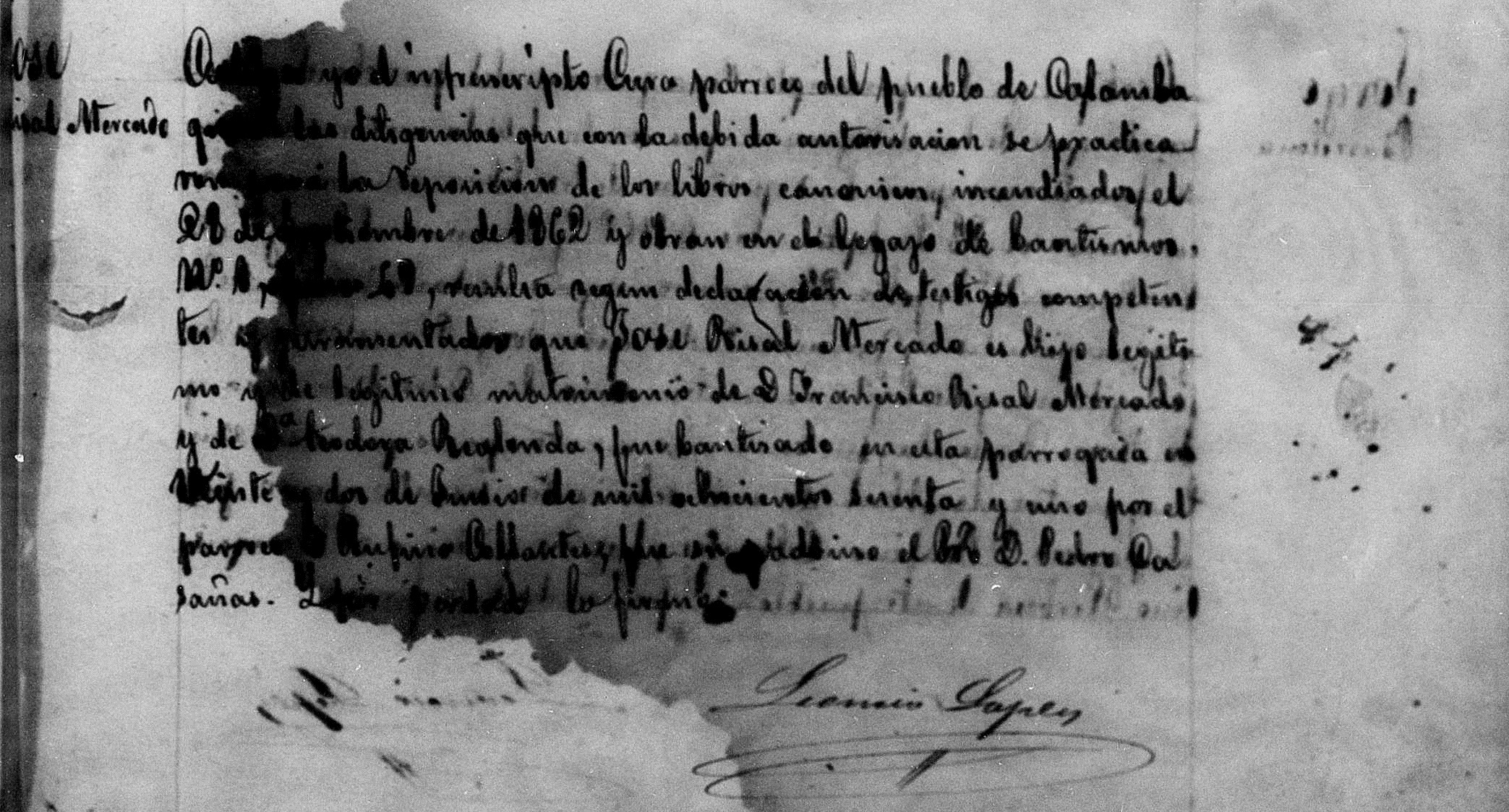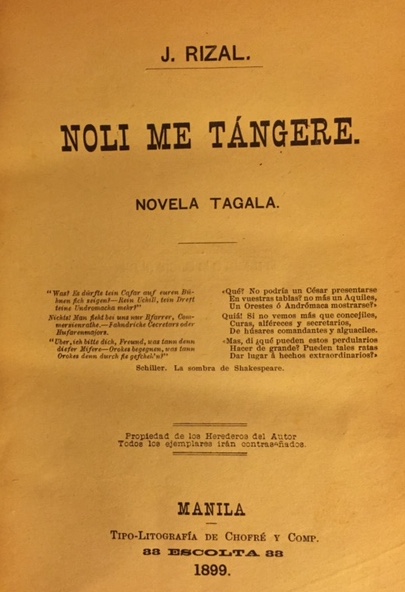|
Propaganda Movement
The Propaganda Movement encompassed the activities of a group of Filipinos who called for political reforms in their land in the late 19th century, and produced books, leaflets, and newspaper articles to educate others about their goals and issues they were trying to solve. They were active approximately from 1880 to 1898, and especially between 1880 and 1895, before the Philippine Revolution began. Prominent members included José Rizal, author of novels '' Noli Me Tángere'' and '' El filibusterismo'', and essays; Graciano López Jaena, publisher of ''La Solidaridad'', the movement's principal organ; Mariano Ponce, the organization's secretary, and Marcelo H. del Pilar. Specifically, the Propagandists aims were the following: * Reinstate the former representation of the Philippines in the Cortes Generales or Spanish Parliament * Secularize the clergy (i.e. use secular or diocesan priest rather than clergy from a religious order) * Legalize Spanish and Filipino equality * ... [...More Info...] [...Related Items...] OR: [Wikipedia] [Google] [Baidu] |
Ilustrados 1890
The Ilustrados (, "erudite", "learned" or "enlightened ones") constituted the Filipino educated class during the Spanish colonial period in the late 19th century. Elsewhere in New Spain (of which the Philippines were part), the term '' gente de razón'' carried a similar meaning. They were middle class Filipinos, many of whom were educated in Spain and exposed to Spanish liberal and European nationalist ideals. The ''Ilustrado'' class was composed of native-born intellectuals and cut across ethnolinguistic and racial lines—'' Indios'', ''Insulares'' and ''Mestizos'', among others—and sought reform through "a more equitable arrangement of both political and economic power" under Spanish tutelage. Stanley Karnow, in his '' In Our Image: America's Empire in the Philippines'', referred to the ''Ilustrados'' as the "rich Intelligentsia" because many were the children of wealthy landowners. They were key figures in the development of Filipino nationalism. [...More Info...] [...Related Items...] OR: [Wikipedia] [Google] [Baidu] |
José Rizal
José Protasio Rizal Mercado y Alonso Realonda (, ; June 19, 1861 – December 30, 1896) was a Filipino nationalist, writer and polymath active at the end of the Spanish colonial period of the Philippines. He is considered the national hero (''pambansang bayani'') of the Philippines. An ophthalmologist by profession, Rizal became a writer and a key member of the Filipino Propaganda Movement, which advocated political reforms for the colony under Spain. He was executed by the Spanish colonial government for the crime of rebellion after the Philippine Revolution broke out; it was inspired by his writings. Though he was not actively involved in its planning or conduct, he ultimately approved of its goals which eventually resulted in Philippine independence. Rizal is widely considered one of the greatest heroes of the Philippines and has been recommended to be so honored by an officially empaneled National Heroes Committee. However, no law, executive order or proclamati ... [...More Info...] [...Related Items...] OR: [Wikipedia] [Google] [Baidu] |
Noli Me Tángere (novel)
''Noli Me Tángere'' (Latin for "''Touch me not''") is an 1887 novel by Filipino writer and activist José Rizal published during the Spanish colonial period of the Philippines. It explores perceived inequities in law and practice in terms of the treatment by the ruling government and the Spanish Catholic friars of the resident peoples a hundred years ago. Originally written by Rizal in Spanish, the book has since been more commonly published and read in the Philippines in either Tagalog (the major indigenous language), or English. The Rizal Law requires ''Noli'' and its sequel, '' El filibusterismo'' to be read by all high school students throughout the country. ''Noli'' is studied in Grade 9 and in Grade 10. The two novels are widely considered to be the national epic of the Philippines. They have been adapted in many forms, such as operas, musicals, plays, and other forms of art. The title originates from the Biblical passage John 20:13-17. In Rizal's time it also refe ... [...More Info...] [...Related Items...] OR: [Wikipedia] [Google] [Baidu] |
Graciano López Jaena
Graciano López y Jaena (; December 18, 1856 – January 20, 1896), commonly known as Graciano López Jaena, was a Filipino journalist, orator, reformist, and national hero who is well known for his newspaper, ''La Solidaridad''. Philippine historians regard López Jaena, along with Marcelo H. del Pilar and José Rizal, as the triumvirate of Filipino propagandists. Of these three ''ilustrados'', López Jaena was the first to arrive in Spain and may have begun the Propaganda Movement, which advocated the reform of the then-Spanish colony of the Philippines and which eventually led to the armed Philippine Revolution that begun in Manila in 1896. The Propaganda Movement was a key step towards a Philippine national identity. Biography Graciano López Jaena was born in Jaro, Iloilo, in the Captaincy General of the Philippines in the Spanish Empire on December 18, 1856. His parents were Plácido López and María Jacoba Jaena. He was baptized as "Graciano López y Jaena" on Decem ... [...More Info...] [...Related Items...] OR: [Wikipedia] [Google] [Baidu] |
La Solidaridad
''La Solidaridad'' (The Solidarity) was an organization created in Spain on December 13, 1888. Composed of Filipino liberals exiled in 1872 and students attending Europe's universities, the organization aimed to increase Spanish awareness of the needs of its colony, the Philippines, and to propagate a closer relationship between the Philippines and Spain. Headed by Galicano Apacible, it also issued a newspaper of the same name which was published in Barcelona, Spain on February 15, 1889. It was edited by Graciano López Jaena and later on by Marcelo H. del Pilar. The social, cultural, and economic conditions of the colonial Philippines were published in ''La Solidaridad''. Speeches of the Spanish liberals about the Philippines were also featured in the newspaper. Members * José Rizal (Laong Laan and Dimasalang) *Marcelo H. del Pilar (Plaridel, Dolores Manapat, Piping Dilat, Siling Labuyo, Cupang, Maytiyaga, Patos, Carmelo, D.A. Murgas, and L.O. Crame) *Graciano López Jaena (D ... [...More Info...] [...Related Items...] OR: [Wikipedia] [Google] [Baidu] |
Mariano Ponce
Mariano Ponce y Collantes (March 22, 1863 – May 23, 1918) was a Filipino physician, writer and active member of the Propaganda Movement. In Spain, he was among the founders of ''La Solidaridad'' and ''Asociación Hispano-Filipino''. Among his significant works was ''Efemerides Filipinas'', a column on historical events in the Philippines which appeared in ''La Oceania Española'' (1892–1893) and ''El Ideal'' (1911–1912). He wrote ''Ang Wika at Lahi'' (1917), a discussion on the importance of a national language. He also served as Bulacan's representative to the Philippine Assembly from 1909 to 1912. Biography Ponce was born in Baliwag, Bulacan where he completed his primary education. He later enrolled at the Colegio de San Juan de Letran and took up medicine at the University of Santo Tomas. In 1881, he traveled to Spain to continue his medical studies at the Complutense University of Madrid, Universidad Central de Madrid. There he joined Marcelo H. del Pilar, Graciano ... [...More Info...] [...Related Items...] OR: [Wikipedia] [Google] [Baidu] |
Marcelo H
Marcelo is a given name, the Spanish and Portuguese form of Marcellus. The Italian version of the name is Marcello, differing in having an additional "l". Marcelo may refer to: * Marcelo Costa de Andrade (born 1967), Brazilian serial killer, rapist, and necrophile *Marcelinho Carioca (Marcelo Pereira Surcin born 1971 in RJ), Brazilian international midfielder in 1990s *Marcelinho Machado (born 1975), Brazilian professional basketball player *Marcelinho Paraíba (Marcelo dos Santos b. 1975 in Paraíba state), Brazilian international midfielder *Marcelinho Paulista (Marcelo José de Souza born 1973 in SP state), Brazilian youth international in 1996 Olympics *Marcelo (footballer, born January 1987), Brazilian footballer *Marcelo (footballer, born May 1987), Brazilian footballer, who played for Lyon * Marcelo (footballer, born 1988), Brazilian footballer, who played for Real Madrid *Marcelo (footballer, born 1989), Brazilian footballer, who plays for Paços Ferreira *Marcelo Arriaga ... [...More Info...] [...Related Items...] OR: [Wikipedia] [Google] [Baidu] |
Cortes Generales
The Cortes Generales (; en, Spanish Parliament, lit=General Courts) are the bicameral legislative chambers of Spain, consisting of the Congress of Deputies (the lower house), and the Senate (the upper house). The Congress of Deputies meets in the Palacio de las Cortes. The Senate meets in the Palacio del Senado. Both are in Madrid. The Cortes are elected through universal, free, equal, direct and secret suffrage, with the exception of some senatorial seats, which are elected indirectly by the legislatures of the autonomous communities. The Cortes Generales are composed of 615 members: 350 Deputies and 265 Senators. The members of the Cortes Generales serve four-year terms, and they are representatives of the Spanish people. In both chambers, the seats are divided by constituencies that correspond with the fifty provinces of Spain, plus Ceuta and Melilla. However, the Canary and Balearic islands form different constituencies in the Senate. As a parliamentary system, ... [...More Info...] [...Related Items...] OR: [Wikipedia] [Google] [Baidu] |
Spanish Nationality Law
Spanish nationality law refers to all the laws of Spain concerning nationality. Article 11 of the First Title of the Spanish Constitution refers to Spanish nationality and establishes that a separate law is to regulate how it is acquired and lost. This separate law is the Spanish Civil Code. Spanish nationality is generally acquired on the principle of '' jus sanguinis'' (descent), with limited additional provision for its acquisition per '' jus soli'' (place of birth). History Traditionally, considerations about the Spanish nationality had been (successively) regulated by constitutional articles: the 5th article of the 1812 Cádiz Constitution, 1st article of the 1837 Constitution, 1st Article of the 1845 Constitution, 2nd article of the unpromulgated 1856 Constitution, 1st article of the 1869 Constitution and 1st article of the 1876 Constitution. Lacking an overarching unifying legal body, the current regulation about nationality in Spain is contained in 17–28th artic ... [...More Info...] [...Related Items...] OR: [Wikipedia] [Google] [Baidu] |
Polo Y Servicios
Polo is a ball game played on horseback, a traditional field sport and one of the world's oldest known team sports. The game is played by two opposing teams with the objective of scoring using a long-handled wooden mallet to hit a small hard ball through the opposing team's goal. Each team has four mounted riders, and the game usually lasts one to two hours, divided into periods called ''chukkas'' or "''chukkers''". Polo has been called "the sport of kings", and has become a spectator sport for equestrians and high society, often supported by sponsorship. The progenitor of the game and its variants existed from the to the as equestrian games played by nomadic Iranian and Turkic peoples. In Persia, where the sport evolved and developed, it was at first a training game for cavalry units, usually the royal guard or other elite troops. A notable example is Saladin, who was known for being a skilled polo player which contributed to his cavalry training. It is now popular ar ... [...More Info...] [...Related Items...] OR: [Wikipedia] [Google] [Baidu] |







